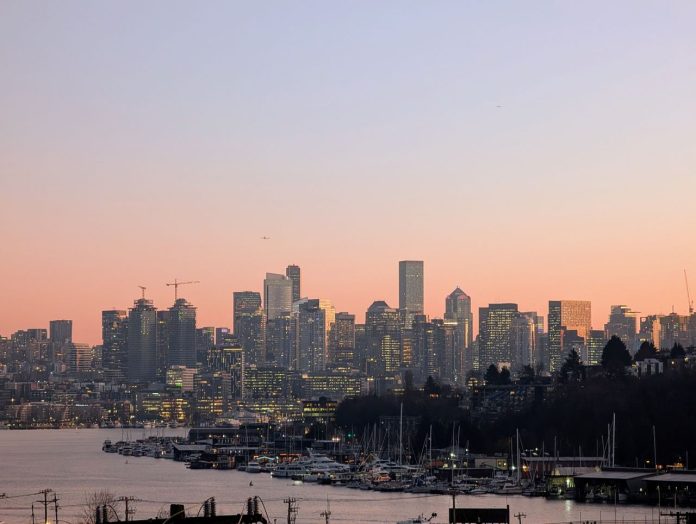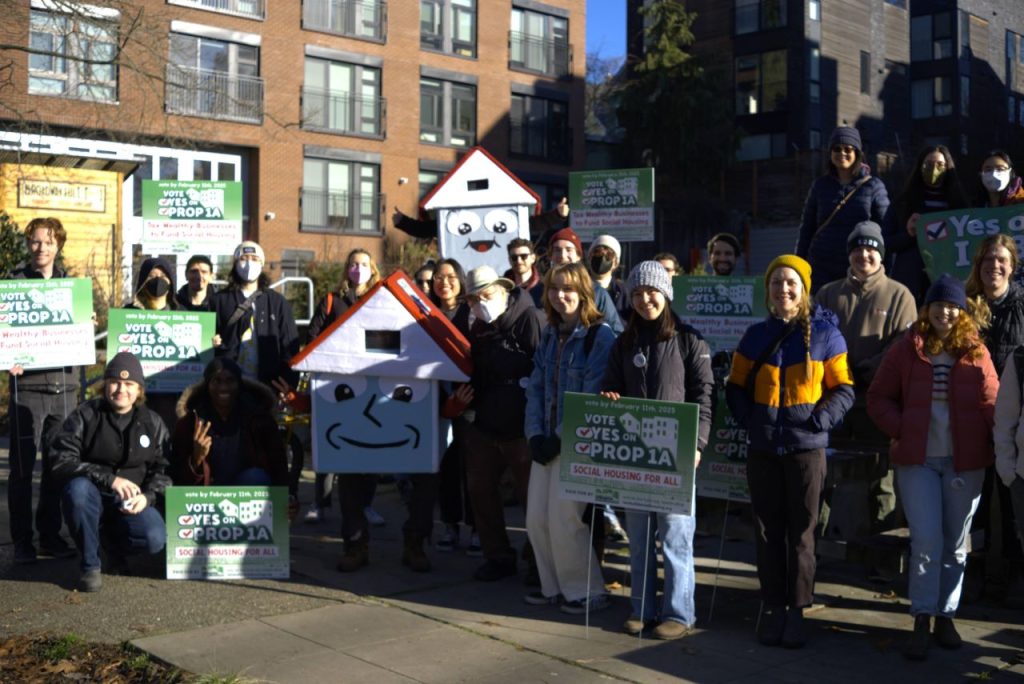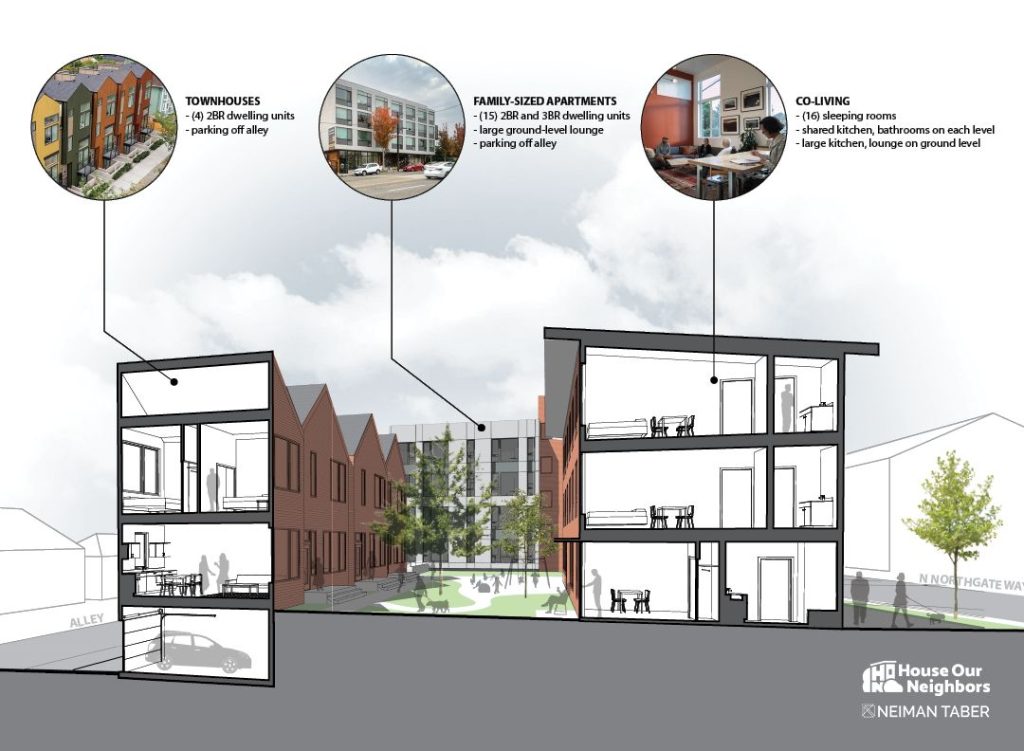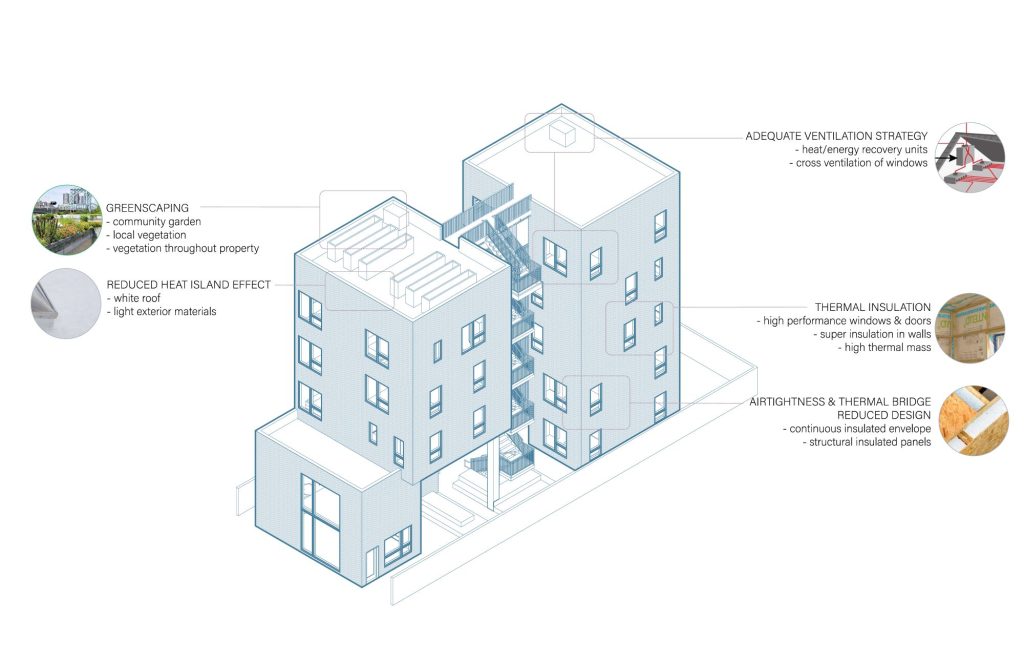
The rents and temps are too damn high. Seattle’s social housing developer can help — with Prop 1A funding.
Seattle has a historic opportunity to become a leader in implementing intersectional solutions to the climate crisis – solutions that tackle deep-rooted inequities, bring down climate pollution, create high-quality skilled union jobs, and improve overall quality of life for many of our communities.
On February 11th, voters have the chance to pass progressive funding for permanently affordable, green, and climate-resilient social housing. Proposition 1A, on your February special election ballot, will create a modest tax on Seattle’s wealthiest corporations to fund the Seattle Social Housing Developer (SSHD), created by a 14-point margin in 2023.
Prop 1A will enable the SSHD to begin building and acquiring permanently affordable, publicly owned, mixed income housing that is good for our climate and for our communities. It’s an absolutely critical step towards addressing both the housing affordability crisis and the worsening climate crisis.

Like the rest of the country, Seattle is facing a persistent and unprecedented housing crisis. The chronically underfunded affordable housing system, although still needed, is proving to be insufficient on its own. Meanwhile, low- and middle-income workers and families face increasing challenges in renting, buying, and keeping homes. And the private real estate market, an industry primarily driven by the pursuit of profits, is certainly not going to meet our housing needs.
At the same time, the climate emergency is accelerating. Urban sprawl, displacement, and buildings contribute significantly to our carbon emissions. Fossil fuels used to heat, cool, and power buildings account for over a third of our climate pollution, making this the fastest-growing source of emissions locally.
To add to that, the cost of living is exploding – rising rents, low wages, and predatory housing practices are pricing people out of the city and forcing them into long, polluting commutes. It is our nurses, social workers, minimum-wage workers, teachers, bus drivers, and other essential workers who are getting pushed out of Seattle. With transportation accounting for nearly 60% of our emissions, making the city more affordable for all is key to tackling climate change.

The housing crisis is a threat to our basic well-being, and especially so as climate change exacerbates instability and already existing inequities. Projections indicate that, without intervention, the city could face more frequent and severe heat waves, with up to 42 days above high-temperature thresholds by 2050. Having access to clean air and cooling during extreme weather like heat waves and wildfire smoke can mean the difference between life and death for many.
All of these problems disproportionately burden frontline communities of color. Black and brown households face the highest utility debts, rent burdens, and environmental pollution. In fact, poorly insulated homes and soaring energy prices are driving the highest utility debts ever seen in the US. The result is a cycle of displacement and economic instability.
Social housing offers us a transformative path forward. It would provide stable, permanently affordable homes for our neighbors, prevent displacement, and curb urban sprawl. Adding more housing with essential services within walking, biking, or rolling distance, and allowing people to live where they work, are among the most important steps a city can take to bring down carbon pollution.
Social housing would also reduce building-related pollution. All development by the SSHD is required to meet Passive House standards – a set of five building principles that require super energy-efficient, highly comfortable housing with excellent ventilation, which is absolutely critical during wildfires.
Passive House standards are designed to drastically reduce the heating and cooling needs of a building, resulting in low overall energy consumption, which would also help us save on utility bills. Moreover, such construction results in extremely climate-resilient structures. The best part is that passive social housing – which would be permanently affordable and publicly owned forever – would create climate resilience for everyone, not just the ultra wealthy.

All of this would help combat a key source of climate pollution, while ensuring our communities have safe, healthy living conditions during extreme weather events. And the benefits don’t end there. Building and maintaining social housing would generate skilled, high-paying jobs, supporting our local workforce and economy.
If the SSHD is to make this vision a reality, it needs funding to get started. Prop 1A will provide a consistent and reliable source of funding by taxing wealthy companies 5% on annual compensation over $1 million to any single employee – an amount these corporations can more than afford to pay.
It’s no secret or surprise that the Chamber of Commerce is throwing its weight behind the deceptive and confusing Proposition 1B – an alternative that would take money from the existing JumpStart payroll tax instead of creating a new source of funding. Taking from an existing pool of funds, a proportion of which is earmarked for affordable housing, leaves less money for nonprofit housing providers.
Prop 1B is nothing more than a thinly veiled effort by mega corporations to avoid paying taxes. It’s not sustainable or sound, and only perpetuates a scarcity mindset when what is desperately needed are new progressive sources of funding, like Prop 1A.
Amazon and Microsoft have both dropped $100,000 backing the Prop 1B campaign. Again, not surprising because we already know wealthy corporations will do everything in their power to avoid paying their fair share. They are not fooling anybody.
Let’s be clear, the Chamber of Commerce does not support social housing. They do not care about essential workers being priced out of the city, or the fact that rents have skyrocketed while wages have stagnated. They care about protecting their bottom lines and using their wealth to control politics – it mirrors what’s happening at the federal level too closely to ignore, and only further underscores the need to unite behind Prop 1A.
The bottom line is that to get on a path to climate, economic, and racial justice in Seattle, we need to build abundant, low-carbon housing in walkable, bikeable, and transit-connected neighborhoods. Building social housing is a significant step towards creating this healthier, more equitable, and more resilient city while tackling climate pollution head-on. Prop 1A gives us the best chance of ushering in this future.
Housing is a human right, a core element in human well-being and flourishing. It’s time we begin treating housing like the public good that it is. Vote yes on Prop 1A by February 11th for a thriving, climate-resilient city.
Editor’s note: The Urbanist Elections Committee has also endorsed a yes on Prop 1A vote. The Urbanist is hosting a meetup with House Our Neighbors at 6pm tonight, February 3 focused on Prop 1A.

Akiksha Chatterji
Akiksha Chatterji is a Campaigns Director at 350 Seattle. Aki is responsible for building, managing, and sustaining 350 Seattle's local Green New Deal campaigns. Email her at aki@350seattle.org.

